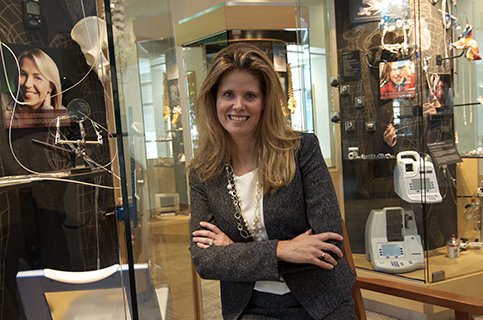Kim Chaffin (ChemE Ph.D. ’99)—Passion for polymers

Kim Chaffin (ChemE Ph.D. ’99) thinks of curiosity as a skill to be developed. But she sees a big difference between idle and productive curiosity. “I think just to be curious for curiosity’s sake doesn’t drive progress,” Chaffin said.
Chaffin is a chemical engineer and distinguished scientist—her actual title—at Medtronic and as a member of the company’s honored Bakken Society. Her specialty is polymers, which she has studied in all kinds of applications—from oilfields, to automobiles, and as components of medical devices inside the human body.
Chaffin acknowledges she entered engineering without much curiosity—about the profession itself or the kinds of problems engineers struggle to solve. Instead, she was just doing the dutiful thing—studying hard to get good grades in hopes of getting a job.
“I found myself with an engineering scholarship and then trying to figure out what kind of an engineer I wanted to be. I was from a small town without any former exposure to what an engineer even did. I have to say I wasn’t very curious only because I did not have enough exposure to the field to know it even existed,” Chaffin said.
I think curiosity is the desire to study a problem deeply, with the goal to learn, not just for yourself, but for the benefit of society. That means making connections that no one has made before, and that’s your contribution to moving that knowledge front forward."- Kim Chaffin
After completing a bachelor’s in chemical engineering at the University of Michigan, she worked on her masters (at Michigan) while helping to design the heating and cooling system of the 1994 Mustang. At Ford, she first felt asked to exercise her curiosity in creative problem solving. The problem was a robot that dispensed glue to seal the headlight lenses and reflectors together. As the factory warmed during the day, the flow rate of adhesive changed and had to be adjusted by hand. Trouble was, the adhesive had to cure for 20 minutes before the lamps could be leak-tested. Meanwhile, 500 headlights were assembled—500 headlights that would have to be thrown away if the adhesive hadn’t been adjusted correctly.
Chaffin was on the team to solve the problem. The most obvious answer—keep the robot warm. “But how do you put a temperature control around a single robot in this gigantic facility?” Instead, they found a way to quick-cure the adhesive in 15 seconds before testing—during which time only four headlamps might be wasted. “It wasn’t so much that we discovered a new way to cure the adhesive,” said Chaffin. “It was about thinking carefully and differently enough that we could solve the problem from a different perspective.”
Taking an educational leave from Ford, Chaffin worked on her Ph.D. at the University of Minnesota, which she felt had the best chemical engineering department in the country. She wrote her thesis on the thermodynamics of block polymers (research sponsored by Exxon because of its importance to the oil industry). Chaffin planned to return to Ford, but her professional life took a turn when she gave a talk on polymers at Medtronic.
Medtronic offered her a research job in its expanding research area. “It was intriguing to me to get in on the ground floor and be an integral part of how to grow research in polymers at Medtronic,” Chaffin said.
At Medtronic, Chaffin has published many papers on materials that must perform without fail inside the body. “I love what I do and my creativity has grown with time. It’s a skill you have to hone and work on. I can point to many mentors I’ve had through the years who have taught me how to ask questions better, how to make better connections.”
To be productive, Chaffin says, curiosity must be harnessed by some disciplined process.
“I think curiosity is the desire to study a problem deeply, with the goal to learn, not just for yourself, but for the benefit of society. That means making connections that no one has made before, and that’s your contribution to moving that knowledge front forward,” she said.
Perhaps the best example—where she found her curiosity tested in college—was in defining, researching, and writing her Ph.D. thesis in the field of polymer thermodynamics. “The goal of the thesis is to expand the engineering knowledge frontier. And if you don’t expand that knowledge frontier in some unique way, you don’t have a thesis that will get you a Ph.D. You have to pick a problem that’s going to motivate you, engage your curiosity over a very long period of time, and be relevant to the scientific community. It is also a time when one can learn from their fellow academics how rewarding well-directed curiosity that eventually drives discovery can be. That’s why I would argue the thesis is where the importance of curiosity is taught,” she said.
